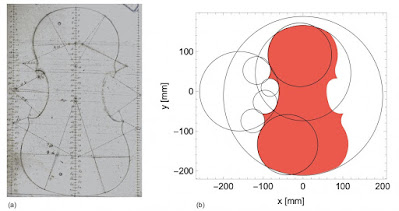The next generation of violins in a study published on Nature Scientific Reports by Politecnico di Milano.
How to predict the sound produced by a tonewood block once carved
into the shape of a violin plate? What is the best shape for the best
sound? Artificial Intelligence offer answers to these questions.

The historical drawing attributed to the workshop of Enrico Ceruti that inspired the outline parameterization (a) and the geometric modeling adopted in the work (b).
Photo: Politecnico di Milano
These are the conclusions that researchers of the Musical Acoustics Lab of Politecnico di Milano presented in a study that was recently published in Scientific Reports...
This work offers an innovative and promising tool in the hands of Cremona violin makers and, in perspective, of the international community. By using a neural network, it will enable luthiers to predict how a tone-wood block will "sound" once carved into a plate. But it can also be used to design two violins with matching acoustic behavior even if built with different wood. In the future this research will allow us to select the best wood to be used for a particular violin, something that today is still based on purely aesthetic considerations.
The full-text version of the article is available here: https:/
Source: EurekAlert










